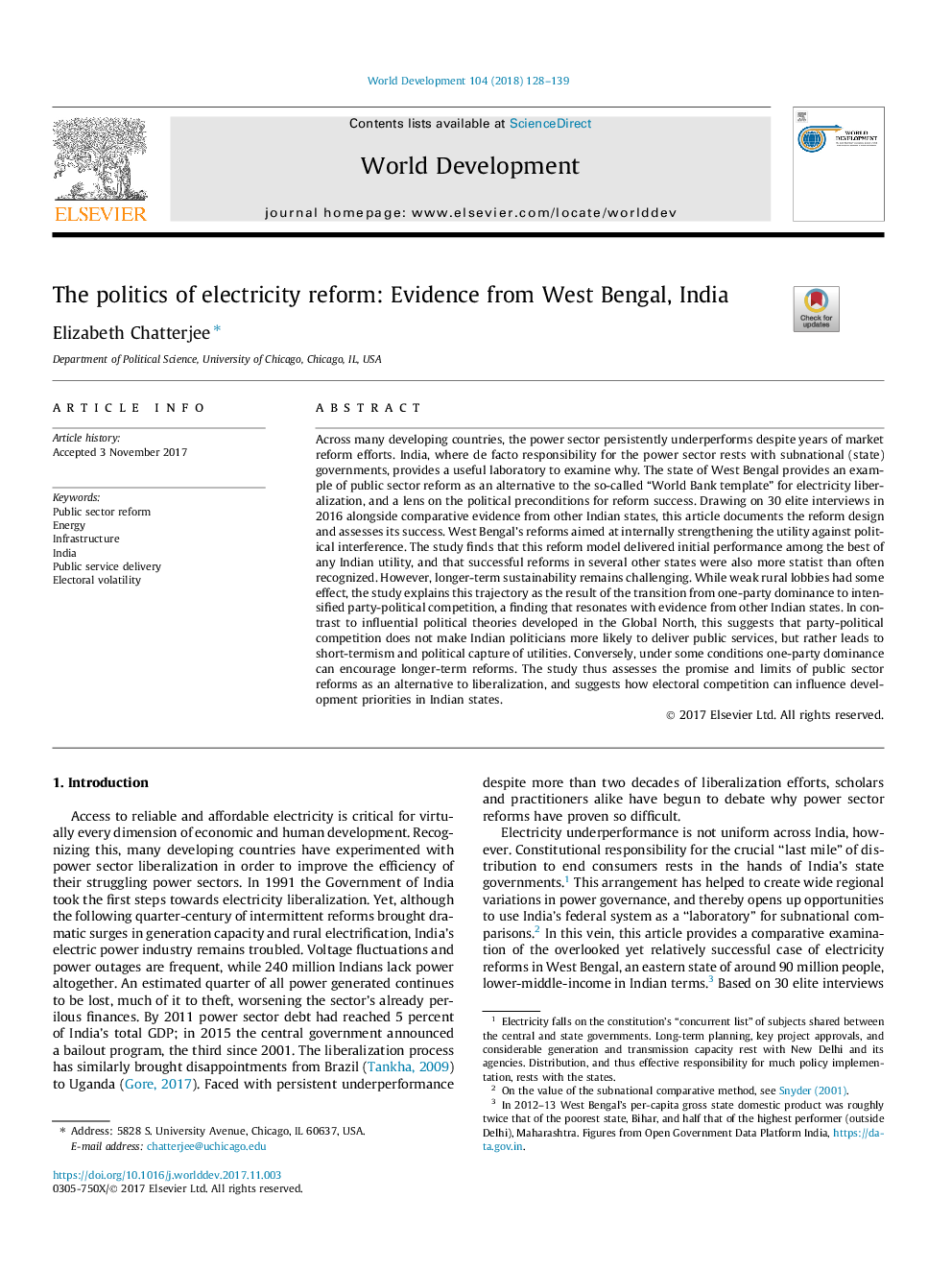| کد مقاله | کد نشریه | سال انتشار | مقاله انگلیسی | نسخه تمام متن |
|---|---|---|---|---|
| 7392077 | 1481114 | 2018 | 12 صفحه PDF | دانلود رایگان |
عنوان انگلیسی مقاله ISI
The politics of electricity reform: Evidence from West Bengal, India
ترجمه فارسی عنوان
سیاست اصلاحات برق: شواهد از بنگال غربی، هند
دانلود مقاله + سفارش ترجمه
دانلود مقاله ISI انگلیسی
رایگان برای ایرانیان
کلمات کلیدی
اصلاحات بخش دولتی، انرژی، زیر ساخت، هند، تحویل خدمات عمومی، نوسانات انتخاباتی،
ترجمه چکیده
در بسیاری از کشورهای در حال توسعه، بخش برق به رغم سال ها تلاش های اصلاحات بازار، به طور مداوم ضعیف عمل می کند. هند، که در آن مسئولیت دفاعی برای بخش برق بر دولتهای محلی (ایالتی) است، یک آزمایشگاه مفید برای بررسی اینکه چرا؟ ایالت بنگال غربی نمونه ای از اصلاحات بخش دولتی را به عنوان جایگزین برای به اصطلاح الگو بانک جهانی معرفی می کند؟ برای آزادسازی برق و یک لنز در پیش شرط های سیاسی برای موفقیت های اصلاحات. در این مقاله، 30 مصاحبه نخبگان در سال 2016 همراه با شواهد تطبیقی دیگر کشورهای هند، این مقاله، طرح اصلاحات را مد نظر قرار می دهد و موفقیت آن را ارزیابی می کند. اصلاحات در بنگال غرب با هدف تقویت ابزار داخلی در برابر دخالت سیاسی بود. این تحقیق نشان می دهد که این مدل اصلاحی عملکرد اولیه را در بین بهترین ابزار هر هند نشان می دهد و اصلاحات موفق در چندین ایالت دیگر نیز ثابت تر از آنچه اغلب به رسمیت شناخته می شود. با این حال، پایداری طولانی مدت همچنان به چالش کشیده می شود. در حالی که لابی های ضعیف روستایی تاثیرات مثبتی داشتند، مطالعه این مسیر را به عنوان نتیجه انتقال از تسلط یک حزب به رقابت سیاسی حزبی تشدید می کند، این یافته که با شواهد دیگر کشورهای هند تفاوتی دارد. بر خلاف نظریه های سیاسی نفوذی که در شمال جهانی ایجاد شده است، این نشان می دهد که رقابت های حزبی سیاسی سیاستمداران هند را بیشتر به ارائه خدمات عمومی نمی رساند، بلکه منجر به کوتاه شدن و تسخیر سیاسی آب و برق می شود. برعکس، در برخی شرایط، تسلط یک حزب می تواند اصلاحات طولانی مدت را تشویق کند. این مطالعه به این ترتیب وعده و محدودیت های اصلاحات بخش دولتی را به عنوان جایگزینی برای آزادسازی ارزیابی می کند و نشان می دهد که چگونه رقابت های انتخاباتی می تواند در اولویت های توسعه در کشورهای هند تاثیر گذار باشد.
موضوعات مرتبط
علوم انسانی و اجتماعی
اقتصاد، اقتصادسنجی و امور مالی
اقتصاد و اقتصادسنجی
چکیده انگلیسی
Across many developing countries, the power sector persistently underperforms despite years of market reform efforts. India, where de facto responsibility for the power sector rests with subnational (state) governments, provides a useful laboratory to examine why. The state of West Bengal provides an example of public sector reform as an alternative to the so-called “World Bank template” for electricity liberalization, and a lens on the political preconditions for reform success. Drawing on 30 elite interviews in 2016 alongside comparative evidence from other Indian states, this article documents the reform design and assesses its success. West Bengal's reforms aimed at internally strengthening the utility against political interference. The study finds that this reform model delivered initial performance among the best of any Indian utility, and that successful reforms in several other states were also more statist than often recognized. However, longer-term sustainability remains challenging. While weak rural lobbies had some effect, the study explains this trajectory as the result of the transition from one-party dominance to intensified party-political competition, a finding that resonates with evidence from other Indian states. In contrast to influential political theories developed in the Global North, this suggests that party-political competition does not make Indian politicians more likely to deliver public services, but rather leads to short-termism and political capture of utilities. Conversely, under some conditions one-party dominance can encourage longer-term reforms. The study thus assesses the promise and limits of public sector reforms as an alternative to liberalization, and suggests how electoral competition can influence development priorities in Indian states.
ناشر
Database: Elsevier - ScienceDirect (ساینس دایرکت)
Journal: World Development - Volume 104, April 2018, Pages 128-139
Journal: World Development - Volume 104, April 2018, Pages 128-139
نویسندگان
Elizabeth Chatterjee,
